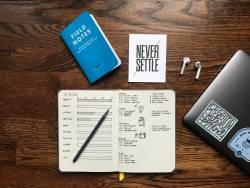
How to Overcome Laziness: 23 Practical Tips from Great Books

Do you know that overcoming laziness is the key to reaching your goals?
“Most people don’t have a talent problem. They have a consistency problem.” - Nicolas Cole, source: twitter
To tackle laziness, you need the right mindset and the right methods. In this article, you will find the best suggestions for handling laziness and procrastination from many great books.
Now, let’s look at those excellent tips:
1. Raise your necessity
“The only difference lies in whether someone decides it is necessary to get better. No necessity, no consistent action.” - Brendon Burchard, High Performance Habits
Make yourself absolutely necessary to achieve your goal. How?
- Do it for someone you love
- Realize that you are going to regret it if you don’t do it
This tip is from the book: High Performance Habits by Brendon Burchard
2. Use the Pomodoro Technique
Using the Pomodoro Technique simply means:
- Step 1: Work for 25 minutes
- Step 2: Then take a 5-minute break
- Step 3: Repeat step 1 and 2 until you need a longer break or you need to rest for the day
The great thing about this technique is that it encourages you to focus on what you need to do in a 25-minute time period. Your task looks much easier to handle when you break it down into smaller pieces. The short breaks also allow you to reduce your chance of getting both your mind and your body too tired. You should stand up, walk around or even do some stretching during your short breaks. You can easily apply this technique by using any pomodoro timer online.
This tip is from the book: The Pomodoro Technique by Francesco Cirillo
3. Ask yourself: what is the one thing you should do right now to make all things easier
You won’t be able to finish everything you want. That’s why prioritizing your tasks is so important. To find out which task you should do first, frequently ask the “focusing question” and the exact question goes like this:
“What is one thing I can do such that by doing it everything else will be easier or unnecessary?” - Gary Keller, The One Thing
This tip is from the book: The One Thing by Gary Keller and Jay Papasan
4. Use checklists
A lot of time, you don’t want to work on a task because the task is too big and you are scared unconsciously. If you break down the task into small steps and put them in a checklist. The task is, all of a sudden, more manageable.
This tip is from the book: The Checklist Manifesto by Atul Gawande
5. Understand that time is limited and you can’t get everything done
By being aware of the fact that you can’t get everything done, you wouldn’t feel as stressed and you would be more willing to prioritize your tasks.
This tip is from the book: Four Thousand Weeks by Oliver Burkeman
You can read the article How to Stop Wasting Your Life to learn more about this book.
6. Focus on the important and not-urgent tasks
It is intuitive to think that you should focus on the tasks that are both important and urgent. However, working on tasks that are important but not-urgent are going to give you big wins and give you satisfaction in life.
This tip is from the book: The 7 Habits of Highly Effective People by by Stephen Covey
7. Realize that having “resistance” to work is normal and beating it is your main goal
“Resistance will tell you anything to keep you from doing your work.” - Steven Pressfield, The War of Art
As explained by Steven Pressfield in his great book The War of Art, “resistance” is the force that keeps you from doing your work. “Resistance” can appear as anything like fear and procrastination. Just realize that having “resistance” is normal and do your work despite its existence.
This tip is from the book: The War of Art by Steven Pressfield
8. Make your tasks tiny
Don’t force yourself to do the full task. Make yourself do a tiny version of that task. For example, if you want to do 30 pushups. Instead of forcing yourself to do all 30, which you would likely not be able to force yourself to do, force yourself to do 1 pushup. Very often, you would find yourself doing more pushups after you finish the 1 pushup.
This tip is from the book: Tiny Habits by BJ Fogg
9. Have a Morning Routine
“Rather than restricting your freedom, a routine gives you freedom by protecting you from the ups and downs of life and helping you take advantage of your limited time, energy, and talent.” - Austin Kleon, Keep Going
There are days when you are not in your top form and when things go wrong. Your morning routine would save you from letting these things disrupt your work. Everyone’s “perfect” routine is different. You can experiment with it and find one that works. The most important thing is to have a routine, not having a perfect one.
This tip is from the book: Keep Going by Austin Kleon
9. Have a Morning Routine
“Rather than restricting your freedom, a routine gives you freedom by protecting you from the ups and downs of life and helping you take advantage of your limited time, energy, and talent.” - Austin Kleon, Keep Going
There are days when you are not in your top form and when things go wrong. Your morning routine would save you from letting these things disrupt your work. Everyone’s “perfect” routine is different. You can experiment with it and find one that works. The most important thing is to have a routine, not having a perfect one.
This tip is from the book: Keep Going by Austin Kleon
10. Use the 5-second rule
The 5-second rule is a tool discovered by the author Mel Robbins. It’s very simple. Whenever you feel like procrastinating, let’s say you want to push yourself to go jogging at 7am and you are about to give up, count 5-4-3-2-1, and then you will suddenly find the power to go jogging. Here’s how Mel Robbins explain it in her book:
“Anytime there’s something you know you should do, but you feel uncertain, afraid, or overwhelmed…just take control by counting backwards 5- 4- 3- 2- 1. That’ll quiet your mind. Then, move when you get to 1.” - Mel Robbins, The 5 Second Rule
11. Use “time blocking”
Try to schedule 4 hours everyday to do your most important thing. 4 hours is ideal while 1 hour still can improve your life a lot. During those hours, do nothing but that single thing. That’s time blocking.
This tip is from the book: Deep Work by Cal Newport
12. Use “bullet journal”
Bullet journal is a super simple and effective journaling system for writing down and organizing your tasks, notes and thoughts. Here’s a 4-minute video on how to bullet journal and it can be the best 4 minutes that you can spend.
This tip is from the book: The Bullet Journal Method by Ryder Carroll
13. Prepare the day before
Right after you finish your work today, spend a few minutes on planning for tomorrow. Decide what are the few tasks that you want to finish tomorrow and decide what is the most important task that you absolutely have to finish. Tomorrow, when you wake up, you just go work on your most important task.
This tip is from the book: Organize Tomorrow Today by Jason Selk, Tom Bartow, Matthew Rudy
14. Have enough sleep
“Sleep is the single most effective thing we can do to reset our brain and body health each day” - Matthew Walker, Why We Sleep
If you don’t have enough sleep, you don’t have the energy to work. That’s it. Sleep is important. If you want to wake up early to work, sleep early.
This tip is from the book: Why We Sleep by Matthew Walker
15. Stay away from your phone when you need to focus at work
“... focus your online time on a small number of carefully selected and optimized activities that strongly support things you value, and then happily miss out on everything else.” - Cal Newport, Digital Minimalism
It’s okay if you choose to spend a little bit of time on your smartphone after work. Treat it as entertainment. But don’t act like constantly checking email, messages and social email is productive. When you want to focus on work, stay away from your phone as much as possible. Don’t be afraid of missing out on the small things.
This tip is from the book: Digital Minimalism by Cal Newport
16. Know what your next small task is
For each project, always write down what the next small task is. If you don’t know it, you will have a hard time continuing to work on the project.
This tip is from the book: Getting Things Done by David Allen
17. Eat healthy
Eat in a way that makes you healthy and not fall asleep during your work hours. Eating healthy allows you to work better, exercise better and sleep better.
This tip is from the book: Eat Move Sleep by Tom Rath
18. Enjoy the process, do not focus on the result
Have a rough goal and decide what your daily task should be. Then focus on doing your daily tasks. Live with the result. That’s your best shot.
This tip is from the book: How to Fail at Almost Everything and Still Win Big by Scott Adams
19. Say no to things that are not the most important to you
If you are not super excited about a new opportunity, just say no. If you say “yes” to something that is kind of good, you will have less time to do things that are great.
This tip is from the book: Hell Yeah or No by Derek Sivers
20. Don’t get distracted by things that you can’t control
There are two kinds of things: things you can control and things you can’t. Worrying about things that you can’t control, you are wasting your time and attention. Focus on things that you can control. Get some work done and don’t worry too much about the result.
This tip is from the book: Meditations by Marcus Aurelius
21. Find reference for your work and “copy”
If you want to write a song, find a song that you like and try to “copy” it. If you “copy” the right way, you will end up creating a product that is different from the one you copied. You would unconsciously add your own twist to it.
This tip is from the book: Decoding Greatness by Ron Friedman
22. Use personal kanban
Limit the amount of tasks you have on hand. 1 is ideal. 3 is the maximum. Be okay with not starting tasks that look tempting to start.
This tip is from the book: Personal Kanban by Jim Benson, Tonianne DeMaria Barry
23. Set a deadline and finish your task on time without getting it perfect
You may want to share your product to the world once you finish it in a perfect way. The truth is that things are never perfect and you will never ship it. Just set a reasonable deadline, finish a version that can meet the deadline and ship it.
This tip is from the book: The Practice by Seth Godin
Final Thoughts
The above are some excellent tips from some great books. Just pick one or a few of them that seem to suit you and overcome your laziness. It’s time to get some work done now.













